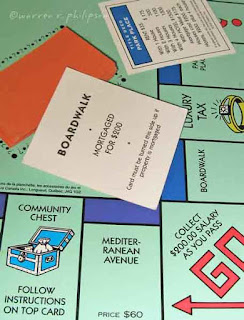 |
Property mortgage à la Monopoly ®. |
I bought my first house 40 years ago. I’m pretty sure it was all done with one page. If there was an application, it was probably a matchbook cover. For last month’s refinancing, the application alone had 45 pages. 45!
Oh, we didn’t have to sign or initial every page; only about half. For the closing, there must have been 75 pages, again only about half requiring some sort of X.
My Signature
I used to be able to sign and subsequently read rather than just recognize my signature. I lost that capability many years ago in the Philippines. It wasn’t the country so much as my first experience working in an office where carbon copies, mimeos and multiple signatures were required for every action or thought. I became a speed signer.
Now, I make no attempt at good signature penmanship. Signing checks to pay bills, I’m usually on a couch with my checkbook balanced on a small notebook, balanced on my thigh. Signing the digital screen in the supermarkets for credit card purchases, I draw a wavy line. (I wouldn’t announce that if anyone ever looked at my wavy line.)
Deciding to Refinance
If you are reading this, paying a mortgage and haven’t refinanced lately, I bet you’re wondering if you should refinance. Easy answer: Will it save you money? Oops, sorry; that’s a question, and the answer may not be easy to determine.
There are a bunch of factors to consider--the nature and status of your present mortgage, the value of your home, how long you expect to be in the home, the best interest rate you can get, what refinancing will cost. The Federal Reserve Board has an excellent Consumer’s Guide (link below).
Our Refinancing
We stayed with a 30-year fixed loan to lower our monthly payment. We’ll recover the costs of refinancing in about 15 months. If we refinanced with a shorter term loan, say, 15 years, we could have saved a bundle in interest compared to the 30-year loan, but we would pay more than we’re currently paying each month. And that savings assumes mortgage payments over the full 30-year term.
Are we going to be in our house 30 years? Put it this way; if I’m around in 30 years, I won’t have foggiest idea where I am. Anyway, if we decide to pay off the loan sooner, we can add funds to the monthly payment to reduce the principal. The new mortgage has no prepayment penalty.
For comparison, my daughter and son-in-law have about 20 years left on their mortgage. They plan to live happily ever after in their home with their unruly beagles and unsociable cats. If they refinance, they’ll lean toward a 20-year fixed loan.
Shopping for a mortgage can be messy. We always start by querying our current mortgage holder. Invariably, we’ve done better with another lender or mortgage broker. In any event, the new Consumer Financial Protection Bureau is working to increase the transparency of the products and improve the qualifications and standards of those involved (link below). Stay tuned.
Wrap Up
 |
This is about the right number
of sheets for practice. |
If and when you’re ready to refinance, it’s critical that you allow time to practice your signature. Begin at least a week ahead of the application. Look for consistency; build wrist, hand and finger endurance. You too can become a speed signer--without ever leaving the country.
Thanks for stopping by.
P.S.
The Federal Reserve Board’s “Consumer’s Guide to Mortgage Refinancings”: http://www.federalreserve.gov/pubs/refinancings/default.htm
The Federal Reserve’s guide provides a link to a mortgage refinancing calculator. Here’s one from the National Association of Realtors®: http://www.realtor.com/home-finance/financial-calculators/mortgage-refinancing-calculator.aspx?source=web
Consumer Financial Protection Bureau’s press release on mortgage financing: http://www.consumerfinance.gov/pressreleases/consumer-financial-protection-bureau-considers-rules-to-simplify-mortgage-points-and-fees/

No comments:
Post a Comment